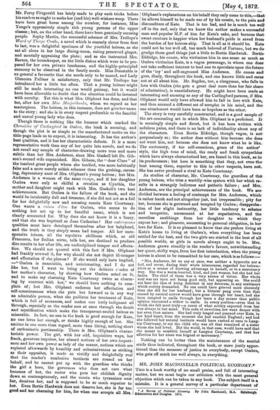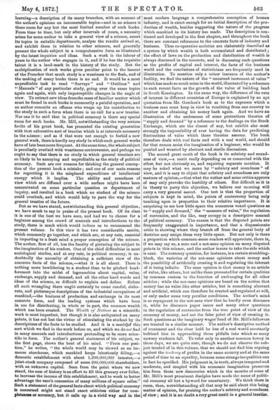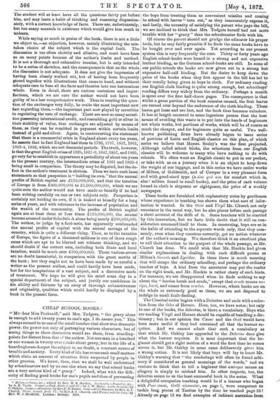MR. JOHN MACDONELL'S POLITICAL ECONOMY-o - nus is a book worthy
of no small praise, and full of interesting matter, but we must begin our criticism with the most general objection which can be taken to any book. The subject itself is a mistake. It is a general survey of a particular department of • A dummy of Political Economy. By John ideedonell, M.A. StUnhortle Edmoneton and Douglas. 1871.
learning—a description of its many branches, with an account of the author's opinions on innumerable topics—and in no science is there room for any but the most limited number of such books. From time to time, but only after intervals of years, a necessity arises for some author to take a general view of a science, assort its topics in suitable departments, analyse the results arrived at, and exhibit them in relation to other sciences, and generally present the whole subject in a comprehensive form as illustrated by the latest inquiries and ideas. Such a work is the labour of years to the author who engages in it, and if he has the requisite talent it is a land-mark in the history of the study. But the multiplication of such works gives peculiar point to the lament of the Preacher that much study is a weariness to the flesh, and of the making of many books there is no end. It would be a most unprofitable task to read " Surveys " and " Outlines" and " Manuals " of any particular study, going over the same topics again and again, with only imperceptible changes in the angle of view. To extract new ideas frombhe mass of familiar matter which must be found in such books is necessarily a painful operation, and an author commits an offence who wraps up his contribution to the study in such a form when there is no call for a new treatise. Nor can it be said that in political economy is there any special room for such books. Mr. Mill, notwithstanding the very serious faults of his great book, has presented the existing generation with that exhaustive sort of treatise which is at intervals necessary in the science ; and as if that were not enough to forbid a new general work, there is hardly any study in which such general works have of late been more frequent. At the same time, the whole subject is peculiarly overlaid with wearisome controversies, and perhaps we ought to say that there is no study in which general treatises are so likely to be annoying and unprofitable as the study of political economy. Such are our reasons for thinking the general concep- tion of the present book a mistake ; and one of our main reasons for regretting it is the misplaced expenditure of intellectual energy which it implies. The ability and soundness of view which are diffused over a wide surface might have been concentrated on some particular question or department of inquiry, and resulted in a book which no student of the science could overlook, and which would help to pave the way for the general treatise of the future.
But as we have stated, notwithstanding this general objection, we have much to say in praise of the present book. Of its class it is one of the best we have seen, and had we to choose for a beginner among the crowd of manuals and introductions to the study, there is much which would induce us to recommend the present volume. In this view it has two considerable merits, which commonly go together, and which are, at any rate, essential in imparting to a fresh mind a proper conception of the science. The author, first of all, has the faculty of picturing the subject to the imagination of his readers. One of the chief difficulties in moat sociological studies, and at any rate, in political economy, is un- doubtedly the necessity of obtaining a sufficient view of the concrete facts of the science,—what it is all about. There is nothing more bewildering to a student than to be pitched head- foremost into the midst of logomachies about capital, value, exchange, supply and demand, and all the other hard words and ideas of the science, so difficult to explain and define. Before all such wrangling there ought certainly to come careful, elabo- rate, and picturesque descriptions of the industrial occupations of mankind,—the business of production and exchange in its most concrete form, and the leading systems which have been in use for distributing, in whole or in part, the common wealth which has been created. The Wealth of Nations as a scientific work is most imperfect, but though it is also antiquated on many points, it has not lost the virtue of stimulating the student by its descriptions of the facts to be studied. And it is a meritlof this sort which we find in the work before us, and which we do not find in many manuals and introductions pretending to be more scien- tific in form. The author's general statement of his subject, on the first page, shows the bent of his mind. "From one posi- tion," he writes, " the whole world may be viewed as an im- mense storehouse, which mankind keeps laboriously filling,—a domestic establishment with about 1,200,000,000 inmates,—a joint-stock company composed of some 200,000,000 shareholders, with an unknown capital. Seen from the point where we now stand, the sum of history is an effort to fill this granary ever fuller, to increase the income of this establishment, and to work to better advantage the race's concession of many millions of square miles." Such a statement of the general facts about which political economy is concerned might not stand exact criticism either for com- pleteness or accuracy, but it calls up in a vivid way and in the
most modern language a comprehensive conception of human industry, and is exact enough for an initial description of the pro- duction of wealth, besides suggesting the nature of the progress which mankind in its history has made. The description is con- tinued and developed in the first chapter, and throughout the book there are constant references to the concrete facts of industry and business. Thus co-operative societies are elaborately described as a system by which wealth is both accumulated and distributed ; the effect of laws on the production and distribution of wealth is always discussed in the concrete, and in discussing such questions as the profits of capital and interest, the facts of the business world and the conclusions of statisticians are frequently used in illustration. To mention only a minor instance of the author's. facility, we find the nature of the " unearned increment of value" which has made so much noise in the world, illustrated by a reference to such recent facts as the growth of the value of building land in South Kensington. In the same way, the difference of the rate of interest in different countries of Europe is explained by an apt quotation from Mr. Goschen'a book as to the expenses which a business man must keep in view in remitting from one country to another and obtaining his money back again. And we have an illustration of the uselessness of some pretentious theories of "supply and demand" by a reference to the dealings on the Stock Exchange, which are the closest of any, but exhibit also most strongly the impossibility of ever having the data for predicting fluctuations of value which these theories assume. The book therefore deals with real facts and with a real world, and should for that reason assist the imagination of a beginner, who would be- puzzled and wearied by abstract and sterile discussions.
The second great merit of the book is its sobriety and sound- ness of view,—a merit really depending on or connected with the other, but not obviously so, and requiring separate mention. It may be asked what we mean by " sobriety and soundness " of view, and it is easy to object that sobriety and soundness are only matters of opinion,—that what the author and some critics approve of may only provoke the hostility of others. But difficult as it is in theory to parry this objection, we believe our meaning will carry a very general assent. One test is that the proportion of subjects is kept in mind, the points of controversy being only touching upon in proportion to their relative importance. It is. surprising to see how little space the numerous vexed questions as to " supply and demand," the " measure of value," the regulation. of currencies, and the like, may occupy in a descriptive manual of political economy. The reason is that the disputed points are frequently exaggerated in importance, and that a dispassionate critic in showing where they branch off from the general body of doctrine may assign them very little space. But not only is there a proportion which common-sense readers will appreciate, there is,. if we may say so, a sane and a not-sane opinion on many disputed points in this science, and the author is sure to take the aide which is sane. The currency question, for instance, is a certain stumbling- block, the varieties of the not-sane opinions about money and the possibility of artificially creating it and regulating the interest of it being infinite. The sane opinion is that money is an article of value, like others, but unlike them promoted for certain qualities by common custom to the function of exchanging for all other articles ; while the not-sane opinions are based on the notion that money has no value like other articles, but is something abstract. and artificial, which can therefore be created and regulated at will, or only under some very peculiar conditions. The author's mind is so repugnant to the not-sane view that he hardly even discusses it, while he discusses paper issues and many other questions. in the regulation of currencies from the true point of view of the economy of money, and not the false point of view of creating it. Such questions as the imaginary wages' fund of Mr. Mill's followers are treated in a similar manner. The author's descriptive method of treatment and the close hold he has of a real world constantly befriend him in approaching those pitfalls into which so many unwary students fall. To refer only to another common heresy in these days, we are quite sure, though we do not observe the sub- ject treated of in this volume, that we should not find him arguing against the tendency of profits in the same country and at the same period of time to an equality, because some strange inequalities can in fact be specified. His judgment is, in truth, always tempered and moderate, and coupled with his economic imagination preserves. him from those uew discoveries which in the mouths of some of Mr. Mill's moat prominent disciples have made the name of politi- cal economy all but a byword for uncertainty. We think there is room, then, notwithstanding all that may be said about this being matter of opinion, for praising the author's sobriety and soundness. of view and it is no doubt a very great merit in a general treatise.
The student will at least have all the questions fairly put before him, and may learn a habit of thinking and reasoning dispassion- ately, with a correct knowledge of facts. There are, unfortunately, but too many manuals in existence which would give him much to unlearn.
While saying so much in praise of the book, there is not a little we object to,—an objection, however, mainly illustrating the mis- taken choice of the subject which is the capital fault. The discussion is too often sketchy and allusive, and must have been so on many points because of the author's limits and method. It is not a thorough and exhaustive treatise, but is only intended to be a series of sketches, and the consequence is that on the whole the discussion is not adequate. It does not give the impression of having been closely worked out, but of having been frequently pieced together with illustrations that came to hand, and without adequate care to fuse all the facts and theories into one harmonious whole. Even in detail, there are curious omissions and imper- fections, which we are sure the author would not have been guilty of in a less comprehensive work. Thus in treating the ques- tion of the exchanges very fully, he omits the most important new fact regarding them,—the important part now played by securities in regulating the rate of exchange. There are now so many securi- ties possessing international credit, and resembling gold or silver in their stability of value, that exchanges are adjusted by means of them, as they can be remitted in payment within certain limits instead of gold and silver. Again, in controverting the statement that there is a commercial crisis in England about every ten years, he asserts that in fact England had them in 1793, 1797, 1857, 1861, 1863-4, 1866, which are not decennial periods. The truth, however, is that the great English crises of 1825, 1837-9, 1847,1857, and 1866, go very far to establish in appearance a periodicity of about ten years in the present century, the intermediate crises of 1861 and 1863-4 being small in comparison. The theory may be disputed, but the de- fect in the author's treatment is obvious. Then we have such loose statements as that pauperism is " holding its own," that the annual profits of British capital are X110,000,000, and that the taxation of Europe is from £800,000,000 to £1,000,000,000, which we are quite sure the author would not have made so broadly if he had been writing carefully on one or two subjects only. Pauperism is certainly not holding its own, if it is looked at broadly for a long series of years, and with reference to the increase of population and the wealth of the community. The profits of British capital again are at least three or four times £110,000,000, the annual income assessed under Schedule A alone being nearly £200,000,000. The author, to judge by a foot-note, has apparently confounded the annual profits of capital with the annual savings of the country, which is quite a different thing. Then, as to the taxation of Europe, the figure of a thousand millions is one of those rough sums which are apt to be blurted out without thinking, and we should doubt if the correct sum, including both State and local taxation, would be much over £500,000,000. These various errors are no doubt immaterial, in comparison with the great merits of the book ; but they ought not to have been made by so careful a writer as the present author, and could hardly have been made, but for the temptations of a vast subject, and a discursive mode of treatment. We hope he will give his mind some day to a special department of the subject, and justify our confidence in his ability and fairness by an essay of thorough exhaustiveness and originality, qualities which could hardly be displayed by a book in the present form.




































 Previous page
Previous page